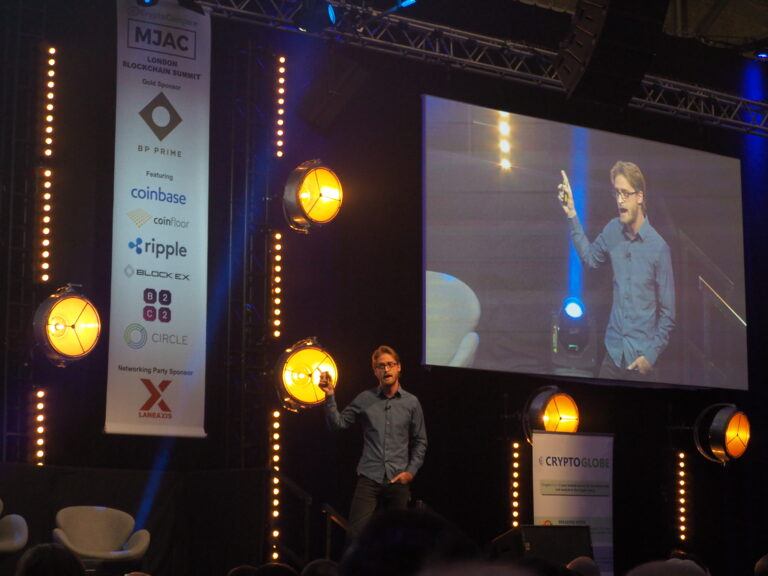Earlier this month, cryptocurrency data provider CryptoCompare teamed up with renowned disruptive tech event organizer MJAC to bring some of the world’s leading blockchain and cryptocurrency experts to London’s financial district
“CryptoCompare & MJAC London Blockchain Summit” featured talks on some of the industry’s hot topics, including how to value cryptoassets, the rise of blockchain technology, and the tokenization of everything. On the main stage, where speakers from companies like as Coinbase, Ernst & Young, Citigroup, and Circle shared their thoughts.
Relative and Fundamental Valuation Approaches to Cryptoassets
Chris Burniske, co-founder of Placeholder Ventures and co-author of the book “Cryptoassets: The Innovative Investor’s Guide to Bitcoin and Beyond,” was the event’s keynote speaker and started it off with an extremely interesting perspective on how cryptocurrencies can be valued, passing through some interesting data points. Focusing on NVT Ratio (Network Value to Transactions Ratio) which is similar to the PE Ratio used in equity markets.
#MJAC #CryptoCompare Keynote speaker @cburniske taking a look at #cryptoasset valuation models. #bitcoin #crypto
“Patterns emerge and tend to be respected by the market” – on @woonomic NVT ratios pic.twitter.com/skjKIauIpV
— CryptoGlobe (@CryptoGlobeInfo) June 13, 2018
He noted that cryptocurrencies are currently valued according to their market cap, which is influenced by their circulating supply. Manipulating said supply allows coin owners to get their coins on top of data providers, which will see investors suffer from fear of missing out (FOMO) and invest. He called this the ‘coin market cap game’ and gave an example of Veritaseum which marketcap was not supported by a healthy daily trading volume.
Will Businesses Who Don’t Consider Blockchain, Risk Falling Behind?
Next up was a panel in which the future of blockchain technology and its applications were discussed by various prominent industry personalities. These were Vitaliy Kedyk, an executive director at crypto exchange CEX.IO, Stephan Tual, founder of Atlas Neue, Edd Carlton, head of OTC Trading at BlockEx, and Norbert Redkie, CEO and founder of TRUST.
There was in depth discussion on companies using what’s right for them, whether that involves blockchain technology or not. The key is not to use blockchain as a buzzword o raise more capital or get a higher valuation. The consensus from the panel was that blockchain technology has been used in many situations when a cheaper and more efficient centralized database would suffice.
“If your only goal is to raise money, there are better, cleaner and safer ways to raise money than blockchain”
Creating an Open Financial System
Zeeshan Feroz, the CEO of Coinbase UK, spoke about how cryptocurrencies are creating an open financial system. During the talk he revealed that Coinbase is:
“trying to rebuild the entire financial system, but [is] trying to accelerate hundreds of years of evolution into, hopefully, a few years.”
The talk even had some controversy when he used the term “new world order” to describe cryptocurrency revolution. Feroz clarified he used the term to refer to a “decentralized future,” not world dominance.
The Tokenization of Everything
Next up was Claire Wells, Circle’s Legal & Business Affairs Director for Europe, she spoke about the tokenization of everything and the advantages blockchain technology brings to the table. Per Wells, through smart contracts we can “reinvent what it means to interact with someone on a legal basis”.
During her talk, Wells made a distinction between three different “buckets” that allow the industry’s key players to operate while protecting consumers and ensuring they won’t stifle innovation. These “buckets” were cryptocurrencies, cryptocommodities, and cryptosecurities.
While cryptocurrencies are payment methods – means of exchanging value – cryptocommodities allow users to “consume” a resource of an application, with Ethereum being an example. Cryptosecurities “are a new form of security,” that has capabilities “way beyond paper-based bonds.”
Are Money Making Machines Too Good to be True?
Joshua Riddett, the founder and managing director of Easy Crypto Hunter, entertained the audience with a talk on cryptocurrency mining machines, dubbing them “money making machines”. During the talk, Riddett addressed the volatility most cryptocurrencies have, and several mining strategies, such as mining RavenCoin instead of a more popular cryptocurrency to increase profits and presumably take advantage of a lower difficulty.
The Future of Crypto Derivatives
Early in the afternoon, the event saw a discussion panel go over the future of cryptocurrency derivatives. The discussion panel included Mark Lamb, head of liquidity at Coinfloor, Ryan Radloff, the CEO of CoinShares UK, and Glen Goodman, an investment expert. The discussion varied throughout the talk, and addressed bitcoin forks, cryptocurrency trading platforms and the profit they potentially make, and whether top cryptocurrencies are or aren’t overpriced. According to Ryan and Mark, physically settled cryptocurrency futures were going to be the ‘holy grail’, however, custodial solutions were still a challenge.
“There is no substitute to owning your own private keys, period.” @RyanRadloff CEO of @CoinSharesCo at @mjac2018 #crypto conference. pic.twitter.com/mqWsv5SujN
— CryptoGlobe (@CryptoGlobeInfo) June 13, 2018
Regulating Cryptocurrencies
A discussion panel on potential cryptocurrency regulations followed, with Teana Baker-Taylor moderating the panel, in which Simon Taylor, a blockchain practice lead at 11:FS, Ruth Wandhöfer the global head of regulatory & market strategy at Citi, and Martin Bartlam the head of finance and projects at DLA Piper, went over the crypto space.
The discussion was extremely interesting, with the panelists noting that it “shouldn’t be easy to raise $100 million”, referring to the initial coin offering (ICO) craze that took over the crypto space. They also addressed plagiarism, valuations, and crimes cryptocurrencies are often associated with, including money laundering and terrorism financing.
“Common #crypto taxonomy frameworks and code of conducts are needed for global regulations to be made” – Regulating #Cryptocurrencies Panel @sytaylor @RWandhofer @mjac2018 @11FSTeam #MJAC #CryptoCompare pic.twitter.com/Cd7c5vKibL
— CryptoGlobe (@CryptoGlobeInfo) June 13, 2018
The full-length videos of the talks can be found on YouTube









